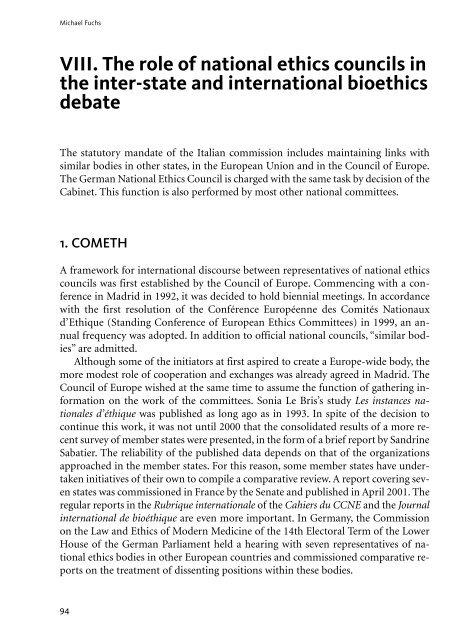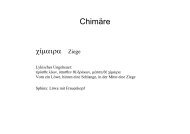Michael Fuchs National ethics councils - Deutscher Ethikrat
Michael Fuchs National ethics councils - Deutscher Ethikrat
Michael Fuchs National ethics councils - Deutscher Ethikrat
Create successful ePaper yourself
Turn your PDF publications into a flip-book with our unique Google optimized e-Paper software.
<strong>Michael</strong> <strong>Fuchs</strong> <strong>National</strong> <strong>ethics</strong> <strong>councils</strong>. Their backgrounds, functions and modes of operation compared<br />
VIII. The role of national <strong>ethics</strong> <strong>councils</strong> in<br />
the inter-state and international bio<strong>ethics</strong><br />
debate<br />
The statutory mandate of the Italian commission includes maintaining links with<br />
similar bodies in other states, in the European Union and in the Council of Europe.<br />
The German <strong>National</strong> Ethics Council is charged with the same task by decision of the<br />
Cabinet. This function is also performed by most other national committees.<br />
1. COMETH<br />
A framework for international discourse between representatives of national <strong>ethics</strong><br />
<strong>councils</strong> was first established by the Council of Europe. Commencing with a conference<br />
in Madrid in 1992, it was decided to hold biennial meetings. In accordance<br />
with the first resolution of the Conférence Européenne des Comités Nationaux<br />
d’Ethique (Standing Conference of European Ethics Committees) in 1999, an annual<br />
frequency was adopted. In addition to official national <strong>councils</strong>, “similar bodies”<br />
are admitted.<br />
Although some of the initiators at first aspired to create a Europe-wide body, the<br />
more modest role of cooperation and exchanges was already agreed in Madrid. The<br />
Council of Europe wished at the same time to assume the function of gathering information<br />
on the work of the committees. Sonia Le Bris’s study Les instances nationales<br />
d’éthique was published as long ago as in 1993. In spite of the decision to<br />
continue this work, it was not until 2000 that the consolidated results of a more recent<br />
survey of member states were presented, in the form of a brief report by Sandrine<br />
Sabatier. The reliability of the published data depends on that of the organizations<br />
approached in the member states. For this reason, some member states have undertaken<br />
initiatives of their own to compile a comparative review. A report covering seven<br />
states was commissioned in France by the Senate and published in April 2001. The<br />
regular reports in the Rubrique internationale of the Cahiers du CCNE and the Journal<br />
international de bioéthique are even more important. In Germany, the Commission<br />
on the Law and Ethics of Modern Medicine of the 14th Electoral Term of the Lower<br />
House of the German Parliament held a hearing with seven representatives of national<br />
<strong>ethics</strong> bodies in other European countries and commissioned comparative reports<br />
on the treatment of dissenting positions within these bodies.<br />
94<br />
At European level, there have been initiatives not only from the Council of Europe<br />
but also from the European Commission. The Secretariat of the European Group on<br />
Ethics in Science and New Technologies issued its first newsletter in February 2003,<br />
on the activities of national <strong>ethics</strong> <strong>councils</strong>. A second newsletter was published in December<br />
2003. Göran Hermerén draws attention in his editorial to the importance of<br />
exchanging information in view of the enlargement of the EU. The Commission<br />
plans to promote exchanges between national <strong>ethics</strong> <strong>councils</strong> in the future.<br />
Website<br />
COMETH: http://www.coe.int/T/E/Legal_Affairs/Legal_co-operation/Bio<strong>ethics</strong>/COMETH<br />
2. Global Summit<br />
The first international summit was held as late as in 1996. Organizations were invited<br />
to San Francisco by the NBAC. Further meetings then took place in Tokyo, London,<br />
Brasília and Canberra. They took the form of satellite conferences of the World<br />
Congress of the International Association of Bio<strong>ethics</strong> and received organizational<br />
support from the WHO in Tokyo and London. Like the Council of Europe, the Global<br />
Summit decided to admit bodies which did not unequivocally possess the status of<br />
a national committee or which belonged to states with more than one relevant body.<br />
Like the second COMETH meeting in Stockholm, the San Francisco Conference<br />
chose the work of <strong>ethics</strong> committees itself as its topic. Usually, however, the main focus<br />
of the Summit’s exchanges is on specific current bioethical issues. In addition to<br />
providing information about the debate in other countries, representation at international<br />
meetings results in better visibility of national debates and positions abroad.<br />
This means that smaller countries such as Portugal or Belgium can also play a part in<br />
the international discussion. In some cases, the national debate and the institutional<br />
framework adopted in individual countries constitute paradigms for newly participating<br />
states. That is why the number of states represented has grown constantly.<br />
Website<br />
Global Summit: http://www.who.int/<strong>ethics</strong>/globalsummit<br />
95




